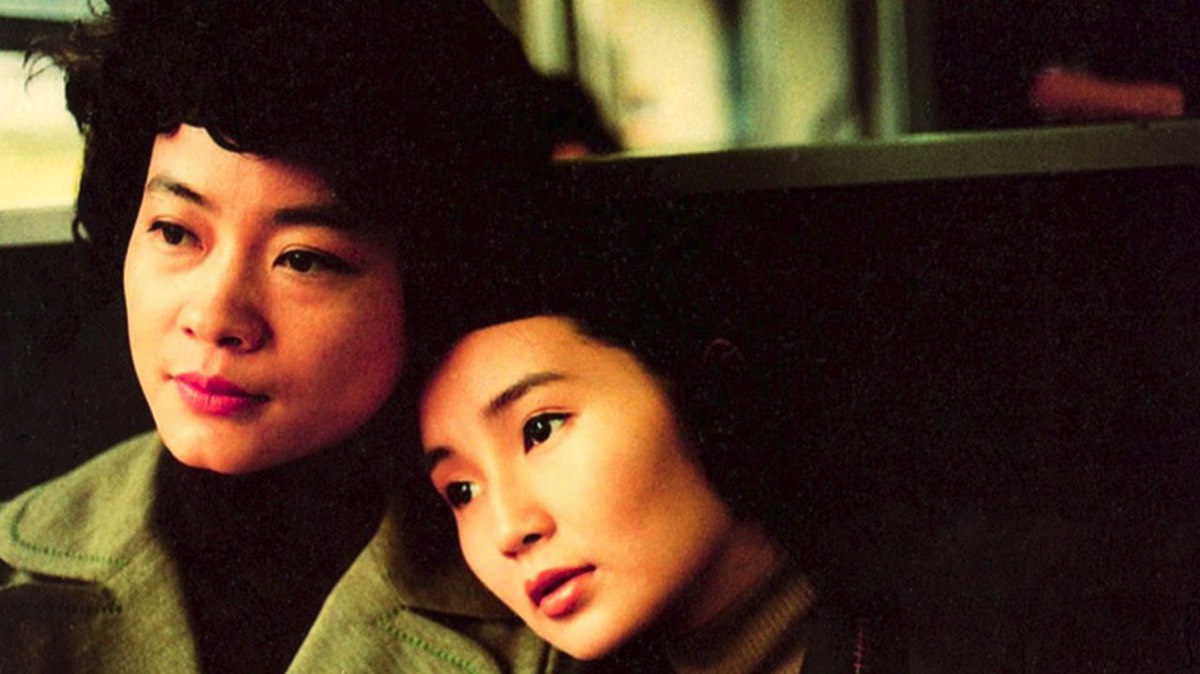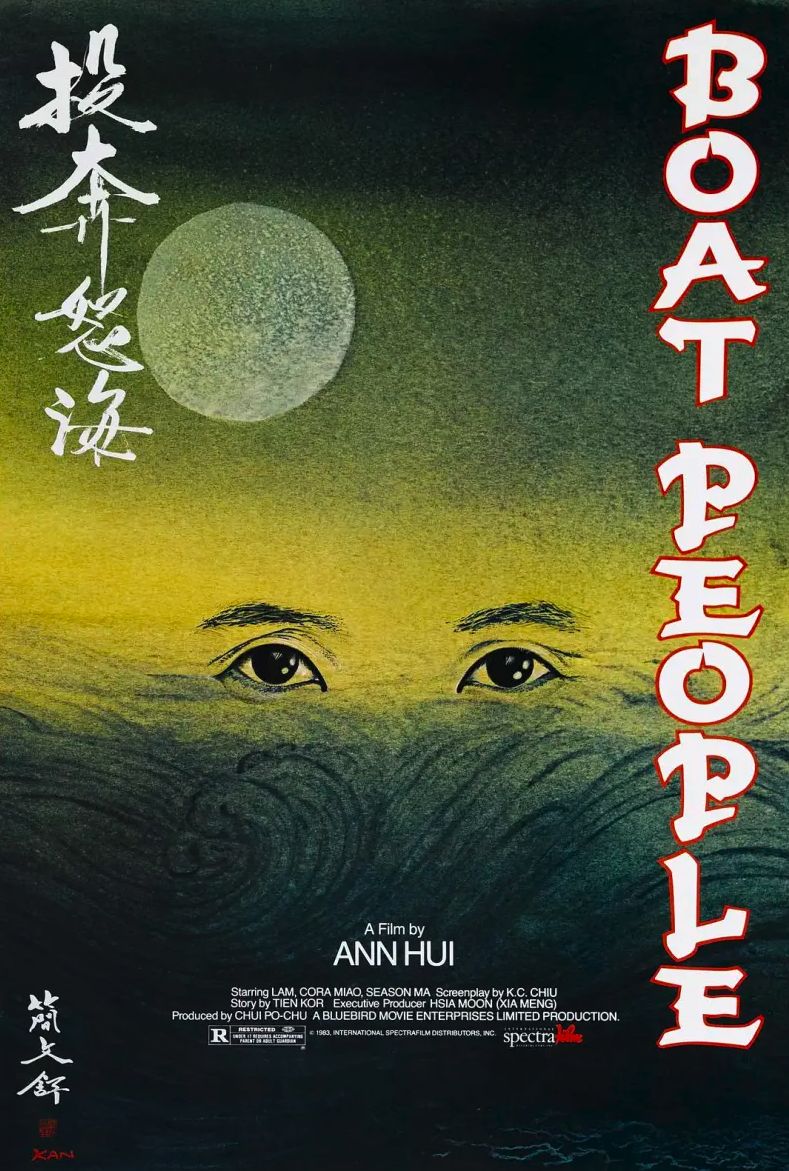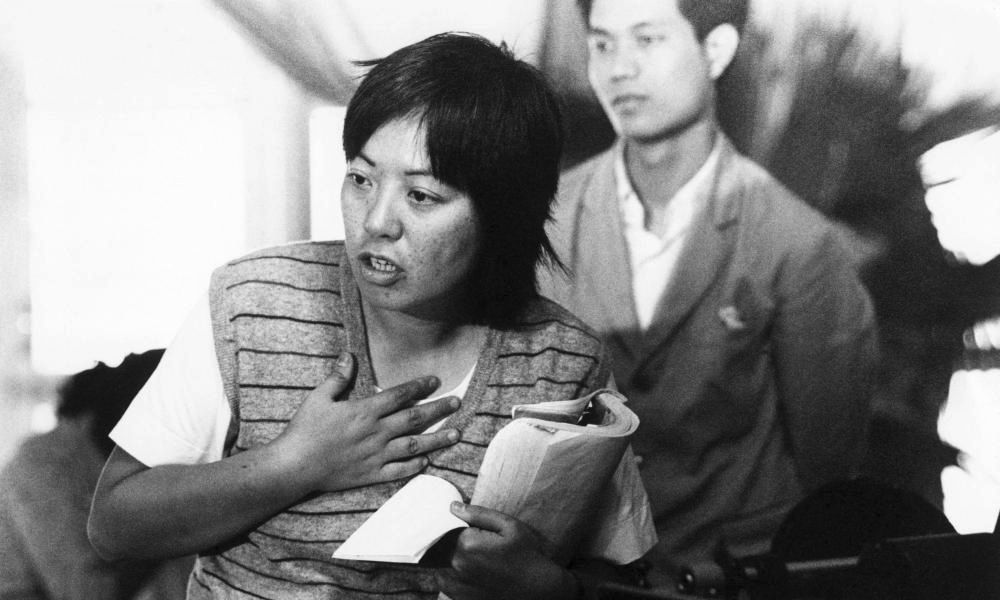"Ann Hui is one of the most distinguished directors in the first new wave of Hong kong filmmaking, which emerged on the international cinema scene during the 1980s. While many of the period's films are eastern variations on the popular gangster and action-adventure genres of Hollywood, Hui's best work is more personal in nature. Her films reflect on cultural displacement, and the effect on individuals who are uprooted from one country and culture and planted in another, either by personal choice or political or economic necessity." - Rob Edelman (The St. James Women Filmmakers Encyclopedia, 1999)
Ann Hui
Director / Producer
(1947- ) Born May 23, Anshan, Liaoning, China
(1947- ) Born May 23, Anshan, Liaoning, China
Key Production Countries: Hong Kong, China
Key Genres: Drama, Romance, Political Drama, Docudrama, Comedy, Action Thriller, Mystery, Horror Comedy, Horror, War
Key Collaborators: Wong Yee-Shun (Editor), Chow Yun-Fat (Leading Actor), Nelson Lik-wai Yu (Cinematographer), Kwong Chi-Leung (Editor), Cora Miao (Leading Character Actress), Lam Man-Yee (Composer), Albert Poon (Production Designer), Tony Au (Production Designer), Anthony Chau-Sang Wong (Character Actor), Andy Lau (Leading Actor), George Lam (Leading Actor), Chan Kin Chung (Screenwriter)
Key Genres: Drama, Romance, Political Drama, Docudrama, Comedy, Action Thriller, Mystery, Horror Comedy, Horror, War
Key Collaborators: Wong Yee-Shun (Editor), Chow Yun-Fat (Leading Actor), Nelson Lik-wai Yu (Cinematographer), Kwong Chi-Leung (Editor), Cora Miao (Leading Character Actress), Lam Man-Yee (Composer), Albert Poon (Production Designer), Tony Au (Production Designer), Anthony Chau-Sang Wong (Character Actor), Andy Lau (Leading Actor), George Lam (Leading Actor), Chan Kin Chung (Screenwriter)
"After two years at the London Film Institute, she returned to Hong Kong in 1975 to work as an assistant to the director King Hu… Her first feature, The Secret (1979), was based on the true-life murder case of a young couple. She followed that with 1980's The Spooky Bunch, a ghost movie, and 1982's Story of Woo Viet (aka God of Killers), about Vietnam refugees in Manila, before directing her most acclaimed film, Boat People (1982), a documentary-style story of a family's escape from Vietnam that received much attention at the Cannes and New York festivals… After My American Grandson (1991), Hui turned to working on genre pictures in Hong Kong's commercial mainstream." - The Film Encyclopedia, 2012
"With a career spanning five decades, Ann Hui is considered one of the most renowned filmmakers from Hong Kong. She studied English and Comparative Literature at the University of Hong Kong, before studying at the London Film School for two years. Like many other Hong Kong filmmakers, she worked for Hong Kong’s Television Broadcasts Limited on several drama series and short documentaries. Since 1979, she has made many features, most of them notable for female perspectives, showing the daily life of women in Hong Kong. She was awarded Best Director no less than five times at the Hong Kong Film Awards, something no other filmmaker has ever achieved." - International Film Festival Rotterdam

Song of the Exile (1990)
"Leading Hong Kong filmmaker whose best works, such as Story of Woo Viet and Boat People (both 1982), deal with contemporary social and political issues." - The Virgin International Encyclopedia of Film, 1992
"As the director of fifteen feature films spanning a period of two decades, Ann Hui has established herself as one of Hong Kong's foremost directors. In the late 1970s, she was a founding member of the Hong Kong New Wave cinema. More impressive is the fact that as a woman, hers is one of the largest bodies of work, not solely in Asia, but worldwide. Although she does not identify herself as a “woman director,” she no longer disparages the term, either. Unlike so many other female directors, Hui has not concentrated on the “woman's picture.” Rather, she has undertaken a wide range of subject matter and worked in various cinematic modes, including narrative fiction and documentary." - Cambridge University Press, 2012
"Ann Hui became widely known with a film depicting brutal treatment of people attempting to escape from Vietnam, Boat People (1982), that was controversial because Hong Kong was frequently the destination of Vietnamese refugees. She moved the Hong Kong new wave toward a more personal cinema with an autobiographical work, Song of the Exile (1989), concerning a woman with a Chinese father and a Japanese mother." - Robert Sklar (Film: An International History of the Medium, 1993)
"One of Hong Kong’s most acclaimed film directors, prolific auteur Ann Hui makes movies that shine a light on people who are usually silenced and marginalised. Ann Hui has spent a career stretching back decades quietly telling the stories of people to whom the culture often fails to give a voice, including refugees, housewives and domestic helpers. Deeply humanistic, her slice-of-life dramas focus on everyday reality, shot in a down-to-earth, undramatic style, and often tackle taboo subjects." - Tatler Asia
"Hui's work is primarily characterized by her constant and daring engagement with current issues, ranging from current topics like Vietnamese refugees to the isolation of elderly people, senile dementia, and gender. Central to much of her work are such themes as emigration, wandering and displacement, all of which are very intimate to Hong Kong people. Song of the Exile relates her own personal experience of emigration and displacement. The second characteristic of her films is the wide variety of their themes. She has not pursued one particular genre, but has worked on horror stories, comedies, historical epics, soap operas and stories of ordinary people." - Fukuoka Prize, 2008
"As one of the most important Hong Kong filmmakers and whose work has often reflected the social, cultural and political concerns pertinent to the region, Ann Hui has worked solidly to sustain a diverse career as a director, writer and producer for the last 45 years. She has also appeared in front of the camera and it is almost impossible to imagine the Hong Kong film industry during this rich era without her presence and influence." - Melbourne Cinémathèque
"My thought process begins at the scriptwriting stage. I believe how you shoot your film is inseparable from the structure and story of your script. However, sometimes I come across ideas during different phases of the script’s completion, such as an idea for structure. In this case, I will talk to the screenwriter about it." - Ann Hui (Cinema Escapist, 2021)
Selected Filmography
{{row.titlelong}}
Ann Hui / Favourite Films
All About My Mother (1999) Pedro Almodóvar, Chinatown (1974) Roman Polanski, Floating Clouds (1955) Mikio Naruse, The Godfather Part II (1974) Francis Ford Coppola, Landscape in the Mist (1988) Theo Angelopoulos, Mirror (1975) Andrei Tarkovsky, Nosferatu (1922) F.W. Murnau, Seven Samurai (1954) Akira Kurosawa, La Strada (1954) Federico Fellini, The Time to Live and the Time to Die (1985) Hou Hsiao-hsien.
Source: Sight & Sound (2012)
All About My Mother (1999) Pedro Almodóvar, Chinatown (1974) Roman Polanski, Floating Clouds (1955) Mikio Naruse, The Godfather Part II (1974) Francis Ford Coppola, Landscape in the Mist (1988) Theo Angelopoulos, Mirror (1975) Andrei Tarkovsky, Nosferatu (1922) F.W. Murnau, Seven Samurai (1954) Akira Kurosawa, La Strada (1954) Federico Fellini, The Time to Live and the Time to Die (1985) Hou Hsiao-hsien.
Source: Sight & Sound (2012)
Ann Hui / Fan Club
Filipe Furtado, Philip Yung, Lui Wing-kai, Fung Ka Ming, Long Tin Shum, Boris Nelepo, Stanley Kwan, Li Cheuk-to, Massimo Causo, Sean Gilman, Tien-Hsiang Wen, Jane Yu.
Filipe Furtado, Philip Yung, Lui Wing-kai, Fung Ka Ming, Long Tin Shum, Boris Nelepo, Stanley Kwan, Li Cheuk-to, Massimo Causo, Sean Gilman, Tien-Hsiang Wen, Jane Yu.
"Fan Club"
These film critics/filmmakers have, on multiple occasions, selected this director’s work within film ballots/lists that they have submitted.
These film critics/filmmakers have, on multiple occasions, selected this director’s work within film ballots/lists that they have submitted.


